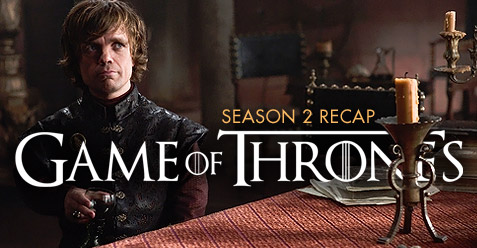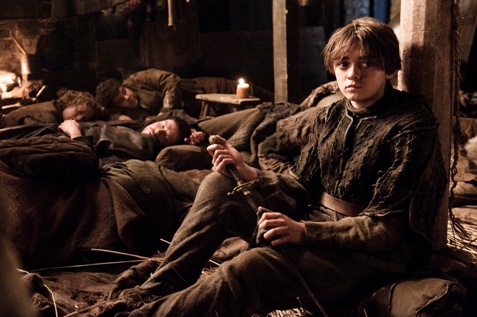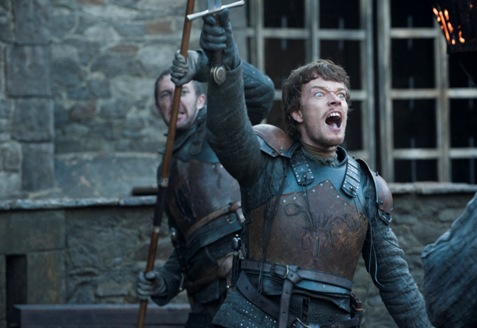Game of Thrones: Season 2 in Review

SPOILER WARNING: All events that have occurred in the TV show are fair game. I have read the books but I will not go any further beyond small hints that only fellow book-readers will catch on to. You’ve been warned.
Note: Because it can be hard to keep all the names and faces straight, the first mention of each character contains a link to a picture of them which will open in a new tab.
Things were different this season. There really was no “Ned,” a central character for the viewer to grab on to, and as such, there really wasn’t a central story arc for us to stash all our hopes and dreams in (only to have them crushed, or, you know, sliced off).
Sure, the beginning of last season was confusing. We all know that every time we recommend “Game of Thrones” to a friend, it’s with the caveat that they’re going to have to fight through the cacophony of misunderstanding that is the first few episodes. All these issues we’re amplified in Season Two, when not only do we have a bucket load of characters (the largest cast on television), but all in different places. Seriously, name a location other than King’s Landing where more than two major characters reside. It can’t be done. And as if that wasn’t enough, the show decided (well, needed) to throw even more characters and locations at us.
It certainly makes for a manageable format for blog posts, but in different hands, the second season of “Game of Thrones” could have been a catastrophic failure. So let’s get a round of applause for showrunners David Benioff and D.B. Weiss, and of course, the cast, namely Peter Dinklage and Alfie Allen, who are headed for Emmy nominations or my name’s Aloysius, and it’s not. I mean that sincerely; whether you’re in a cubicle or your living room wearing your polka dot boxers, I want all of you to get up out of your chairs. I want you to get up right now and go to the window. Open it, stick your head out and yell, “I’m mad as hell and I can’t go another year without ‘Game of Thrones‘!”
Think of how ballsy it is, when upwards of ten locations could be present in any given show, to have an entire episode devoted to just one (“Blackwater”), leaving the finale to somehow wrap up every other story line. Amazingly, “Game of Thrones” was able to do it, everything else it had to, and so much more. Now, back to that manageable blog post format, where I’ll discuss the three best (or my three favorite) character and thematic developments of the season.
Arya the Ruthless, Tywin the Old Softy
Out of necessity, Season Two diverged from the books a great deal more than the first season did. Some changes couldn’t be helped, and a slight few were questionable, but most breathed new life into the source material. Perhaps the best and brightest example of this is Arya serving as a cupbearer for Lord Tywin rather than Roose Bolton, one of her brother Robb’s bannermen.
I could get into the complicated scenario by which Arya comes to serve in a Bolton-occupied Harrenhal, but what you need to know is this: while the specifics were changed, the general theme and atmosphere of the arc remained the same, and condensing the scene meant interactions between the fantastic-despite-her-age Maisie Williams and old pro Charles Dance. But more important was the interaction between the two characters, which showed us two things: Arya’s continued growth into a cold killer fending for herself, and a softer side of the impossibly thick-skinned Tywin Lannister.
The line was altered for the show, but in “A Game of Thrones,” Ned tells Arya, “When the snows fall and the white winds blow, the lone wolf dies, but the pack survives.” Winter is coming, but Arya has been forced to watch as her pack has been taken from her one by one. She is the lone wolf, and if she hopes to survive she must grow up fast.
As of yet, that hasn’t been a problem. In episode five, “The Ghost of Harrenhal,” Tywin caught her in a lie. Arya claimed she was Maidenpool, but knowing she’s a Northerner, he asks where she’s really from, and Arya’s got the stones to follow it up with another lie. Then she looks him right in the eye and tells him she doesn’t believe Robb can’t be killed, as some in the North believe, because “anyone can be killed.” The subtext here is “even you.” She doesn’t even blink.
We also saw Arya grow from a mouse in a cage whispering names to an assassin, or having an assassin at her disposal at least. Jaqen grants her the greatest power there is in the world of “Game of Thrones,” the power of life and death. She uses her first kill to avenge all those the Tickler tortured, and the second to save her own skin. In perhaps her greatest stroke of genius yet, for her third kill, a girl gives Jaqen his own name, which allows her, Gendry and Hot Pie to escape Harrenhal unharmed.
Conversely, Tywin is known as one of the most ruthless machinators in the realm, which he is, but this season we got to see the other side of the coin — how he got to be that way and why he does the things he does. Tywin’s father Tytos, who was known as the “Toothless Lion,” was “a good man, but a weak man, and nearly destroyed our house and name.” The back story, which we get only second hand in the show, is that of the Reyne-Tarbeck rebellion. When Tywin was just 18, the two houses rebelled because of the perceived vulnerability of the Lannisters. It was Tywin, not Tytos, who went to crush the rebellion, and by the end of the war each of the enemy houses was obliterated and their seats burned. The events were made famous in the song “The Rains of Castamere,” as heard both in the tavern and during the end credits of “Blackwater” (don’t Google it or read YouTube comments to avoid spoilers).
Tywin is a human being, and his discussion of teaching the dyslexic Jaime to read and the way Arya reminds him of Cersei displayed this. But perhaps the greatest example of his humanization are his attempts to protect Arya, who he has no relationship with other than that of servant-master. In “A Man Without Honor,” Tywin told her to say “m’lord” rather than “my lord” if she wants to pass herself off as a commoner. Though he may be a “bad guy” and responsible for countless misdeeds, like every other character in “Game of Thrones,” Tywin is a shade of gray. The man cares about only two things: his family and its name, and he’s doing what he can to protect them in the only way he knows how. If you think about it like that, he and Robb, the “good guy,” really aren’t all that different.
Theon Greyjoy: Kraken or Wolf?
One of the things the show actually did better than the books was display Theon’s inner conflict. First, some back story: six years after Robert overthrew the Targaryens, Theon’s father Balon named himself King of the Iron Islands and rebelled against the Throne. By the time Balon surrendered, his two eldest sons had been killed. As punishment, Theon, his last surviving son, was made a ward of House Stark.
Theon was raised among the Stark children, but he was never one of them. In the finale, he tells Maester Luwin, “I saw [Winterfell for the first time] and I thought ‘of course Ned Stark crushed our rebellion and killed my brothers, we never stood a chance against a man who lives here,'” before asking, “Do you know what it’s like to be told how lucky you are to be someone’s prisoner?”
Theon was one of the first to swear his sword to Robb Stark when he was named King in the North. But when he was sent as an envoy to bring the Iron Islands to Robb’s cause, he was caught between his two families, religions, cultures, and as it turned out, sides in the war. Theon chose his blood family, and it’s clear that decision haunts him every single day.
With the devil that is Dagmer Cleftjaw sitting on his shoulder, Theon does horrible things. He seizes Winterfell, kills Ser Rodrik, and burns two orphans boys, passing them off as Bran and Rickon after they escape. In his conversation with Luwin, the maester tells him, “You’re not the man you’re pretending to be,” to which Theon responds, “You may be right, but I’ve gone too far to pretend to be anything else.”
In the end, both of Theon’s families have turned their backs on him. As for what his future holds as a captive, we’ll just have to wait and see, but I’ll bet it rhymes with bleak.
The Rise and Fall of Tyrion Lannister
Both the second season of “Game of Thrones” and “A Clash of Kings” might be more aptly named “Tyrion Lannister: Bad-freakin-ass.” With his father off fighting the war, Tyrion is sent to King’s Landing to serve as acting Hand of the King, which he announces to Cersei when he walks oh so triumphantly into the chambers of the Small Council (whistling “The Rains of Castamere,” no less). As the only sensible Lannister in the capital, Tyrion’s got a lot on his plate: there’s his psychopathic idiot of a nephew, King Joffrey, first of his name; his overly-paranoid sister; and, of course, all the problems that come from having two such people in charge. Ironically, he gets blamed for many of these problems because he’s different; it’s just easier that way.
There is a line in “A Clash of Kings” that nicely sums up Tyrion in his role as the “good guy” on the “bad team.” Shae asks him what he will do now that he is Hand of the King and Tyrion responds, “Something Cersei will never expect… I’ll do justice.” But the most important thing Tyrion does to save the city is, well, save the city. Without Tyrion’s plan to use wildfire against Stannis’s troops during the Battle of the Blackwater, the city would have surely fallen.
Then there’s the actual battle. As he tells Shae early on, while most others can leave or switch sides, Tyrion wasn’t given a choice. He’s a Lannister. And when Joffrey leaves to “hide behind his mother’s skirts” during the fighting, it is put on Tyrion to take charge. The Imp gives a rousing battle speech before quite literally leading the charge, dwarfism be damned. His reward for all of this, of course, is a sword to the face from one Ser Mandon Moore of the Kingsguard, presumably on Cersei’s orders.
Now, Tyrion is left disfigured, and since his father arrived in King’s Landing, stripped of his title and power. However, Tyrion is still Tyrion; he refuses to run away with Shae because he intends to get his revenge somehow. “In the game of thrones you win or you die,” as Cersei is so keen on saying, and Tyrion ain’t dead yet, so the Queen bitch better look out.
Well, that’s it, another fantastic season of “Game of Thrones” in the books. Worry not, only 299 days until Season Three!
Related Posts
You can follow us on Twitter and Facebook for content updates. Also, sign up for our email list for weekly updates and check us out on Google+ as well.
Posted in: Television
Tags: Alfie Allen, Arya Stark, Balon Greyjoy, Cersei Lannister, Charles Dance, Game of Thrones, Game of Thrones blog, Game of Thrones Season Two, Game of Thrones Season Two recap, Jaime Lannister, Jaqen H'ghar, Maisie Williams, Nate Kreichman, Ned Stark, Peter Dinklage, Robert Baratheon, Roose Bolton, Theon Greyjoy, Tyrion Lannister, Tywin Lannister












